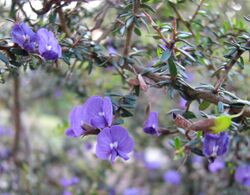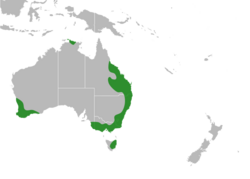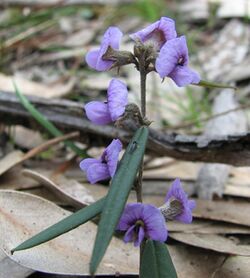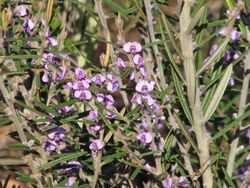Biology:Hovea
| Hovea | |
|---|---|

| |
| Hovea acanthoclada | |
| Scientific classification | |
| Kingdom: | Plantae |
| Clade: | Tracheophytes |
| Clade: | Angiosperms |
| Clade: | Eudicots |
| Clade: | Rosids |
| Order: | Fabales |
| Family: | Fabaceae |
| Subfamily: | Faboideae |
| Tribe: | Brongniartieae |
| Genus: | Hovea R.Br.[1] |
| Species | |
|
See text. | |

| |
| Range of Hovea[2] | |
| Synonyms[1] | |
| |


Hovea is a genus of about forty species of flowering plants in the family Fabaceae, and is endemic to Australia. Plants in this genus are sub-shrubs, shrubs or small trees with simple leaves and purple, blue or mauve flowers with a white centre. The fruit is a pod containing brown to blackish seeds. Species of Hovea occur in all Australian states, the Australian Capital Territory and the Northern Territory.
Description
Plants in the genus Hovea are sub-shrubs, shrubs or sometimes small trees. The leaves are arranged alternately and are simple, usually with stipules at the base and sometimes with prickly edges. The flowers are arranged in leaf axils with bracts, and two bracteoles at the base of the sepals. The upper two sepal lobes are usually joined to form a broad "lip". The petals are purple, blue or mauve, rarely white, and the standard petal is circular to oblate, longer than the wings and keel. The ten stamens are joined into a sheath open on the upper side, and differ in length. There are usually only two ovules in the ovary and the fruit is a spherical to oval pod. The seeds are usually 4–6 mm (0.16–0.24 in) long and brown to black with an aril.[3][4][5][6]
Taxonomy
The genus Hovea was first formally described in 1812 by Robert Brown in Aiton's Hortus Kewensis, and the first species he described were H. linearis and H. longifolia.[7][8] The genus name honours the Polish botanist and plant collector, Anton Pantaleon Hove.[9]
Distribution
Species of Hovea occur in all states and mainland territories of Australia.[3][4][5][6][10]
Species list
The following is a list of species of Hovea accepted by the Australian Plant Census as at June 2021:[11]
- Hovea acanthoclada (Turcz.) F. Muell. – thorny Hovea (W.A.)
- Hovea acutifolia A. Cunn. ex G. Don – northern Hovea (Qld., N.S.W.)
- Hovea angustissima I. Thomps. (Qld.)
- Hovea apiculata A. Cunn. ex G. Don (Qld., N.S.W.)
- Hovea arnhemica J. H. Ross (N.T.)
- Hovea asperifolia I. Thomps. (N.S.W., A.C.T., Vic.)
- Hovea chorizemifolia DC. – holly-leaved Hovea (W.A.)
- Hovea clavata I. Thomps. (Qld.)
- Hovea corrickiae J. H. Ross (Vic., Tas.)
- Hovea cymbiformis I. Thomps. (N.S.W.)
- Hovea densivellosa I. Thomps. (Qld.)
- Hovea elliptica (Sm.) DC. – tree Hovea (W.A.)
- Hovea graniticola I. Thomps. (N.S.W., Qld.)
- Hovea heterophylla A. Cunn. ex Hook. f. (Qld., N.S.W., A.C.T., Vic., Tas.)
- Hovea impressinerva I. Thomps. (Qld., N.S.W.)
- Hovea lanceolata Sims (Qld., N.S.W.)
- Hovea linearis (Sm.) R. Br. – common Hovea (S.A., Qld., N.S.W.)
- Hovea longifolia R. Br. – rusty pods, long-leaf Hovea (N.S.W.)
- Hovea longipes Benth. (Qld., N.S.W.)
- Hovea lorata I. Thomps. (Qld., N.S.W.)
- Hovea magnibractea I. Thomps. (Vic., Tas.)
- Hovea montana (Hook. F.) J. H. Ross – mountain Hovea, alpine rusty-pods, alpine Hovea (N.S.W., A.C.T., Vic., Tas.)
- Hovea nana I. Thomps. & J. H. Ross (Qld.)
- Hovea nitida I. Thomps. (Qld.)
- Hovea pannosa A. Cunn. ex Hook. f. (N.S.W., Vic.)
- Hovea parvicalyx I. Thomps. (Qld.)
- Hovea pedunculata I. Thomps. & J. H. Ross (Qld., N.S.W.)
- Hovea planifolia (Domin) J. H. Ross (Qld.)
- Hovea pungens Benth. – devil's pins (W.A.)
- Hovea purpurea Sweet (S.A., N.S.W., Vic.)
- Hovea ramulosa A. Cunn. ex Lindl. (Qld., N.S.W.)
- Hovea rosmarinifolia A. Cunn. – mountain beauty (N.S.W., Vic.)
- Hovea similis I. Thomps. (Qld., N.S.W.)
- Hovea speciosa I. Thomps. (N.S.W.)
- Hovea stricta Meissner (W.A.)
- Hovea tasmanica I. Thomps. & J. H. Ross (Tas.)
- Hovea tholiformis I. Thomps. (Qld.)
- Hovea trisperma Benth. – common Hovea (W.A.)
References
- ↑ 1.0 1.1 "Hovea". Australian Plant Census. https://biodiversity.org.au/nsl/services/apc-format/display/69207.
- ↑ "Phylogenetic studies of the tribe Brongniartieae (Fabaceae) using nuclear DNA (ITS-1) and morphological data". Syst Bot 26 (3): 557–570. 2001. doi:10.1043/0363-6445-26.3.557.
- ↑ 3.0 3.1 "Genus Hovea". Royal Botanic Garden Sydney. https://plantnet.rbgsyd.nsw.gov.au/cgi-bin/NSWfl.pl?page=nswfl&showsyn=&dist=&constat=&lvl=gn&name=Hovea.
- ↑ 4.0 4.1 "Hovea Sm.". FloraBase. Western Australian Government Department of Parks and Wildlife. https://florabase.dpaw.wa.gov.au/browse/profile/21576.
- ↑ 5.0 5.1 "Hovea". State Herbarium of South Australia. http://www.flora.sa.gov.au/cgi-bin/speciesfacts_display.cgi?form=speciesfacts&name=Hovea.
- ↑ 6.0 6.1 Ross, James H.. "Hovea". Royal Botanic Gardens Victoria. https://vicflora.rbg.vic.gov.au/flora/taxon/c81a1511-0523-4a40-bfca-ac2de6301d29.
- ↑ "Hovea". Australian Plant Name Index. https://biodiversity.org.au/nsl/s.ervices/rest/instance/apni/478774. Retrieved 27 June 2021.
- ↑ Brown, Robert (1812). Hortus Kewensis. 4. London: Longman, Hurst, Rees, Orme and Brown. p. 275. https://www.biodiversitylibrary.org/item/185200#page/285/mode/1up. Retrieved 27 June 2021.
- ↑ Sharr, Francis Aubi; George, Alex (2019). Western Australian Plant Names and Their Meanings (3rd ed.). Kardinya, WA: Four Gables Press. p. 86. ISBN 9780958034180.
- ↑ "Hovea". Northern Territory Government. http://eflora.nt.gov.au/factsheetGenus?id=2301.
- ↑ "Hovea". Australian Plant Census. https://biodiversity.org.au/nsl/services/search/taxonomy?product=APC&tree.id=51209179&name=Hovea&inc._scientific=&inc.scientific=on&inc._cultivar=&max=1000&display=apc&search=true.
Wikidata ☰ Q2714213 entry
 |

